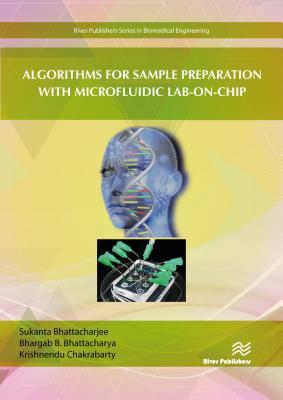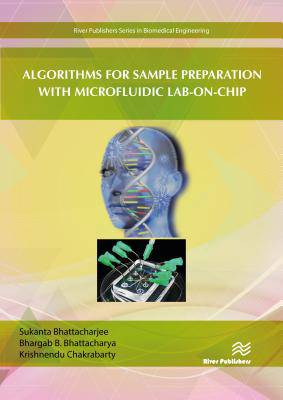
- Afhalen na 1 uur in een winkel met voorraad
- Gratis thuislevering in België vanaf € 30
- Ruim aanbod met 7 miljoen producten
- Afhalen na 1 uur in een winkel met voorraad
- Gratis thuislevering in België vanaf € 30
- Ruim aanbod met 7 miljoen producten
Algorithms for Sample Preparation with Microfluidic Lab-on-Chip
Sukanta Bhattacharjee, Bhargab B Bhattacharya, Krishnendu ChakrabartyOmschrijving
Recent microfluidic technologies have brought a complete paradigm shift in automating biochemical processing on a tiny lab-on-chip (a.k.a. biochip) that replaces expensive and bulky instruments traditionally used in implementing bench-top laboratory protocols. Biochips have already made a profound impact on various application domains such as clinical diagnostics, DNA analysis, genetic engineering, and drug discovery, among others. They are capable of precisely manipulating micro-/pico-liter quantities of fluids, and provide integrated support for mixing, storage, transportation, and sensing, on-chip. In almost all bioprotocols, sample preparation plays an important role, which includes dilution and mixing of several fluids satisfying certain volumetric ratios. However, designing algorithms that minimize reactant-cost and sample-preparation time suited for microfluidic chips poses a great challenge from the perspective of protocol mapping, scheduling, and physical design.
Algorithms for Sample Preparation with Microfluidic Lab-on-Chip attempts to bridge the widening gap between biologists and engineers by introducing, from the fundamentals, several state-of-the-art computer-aided-design (CAD) algorithms for sample preparation with digital and flow-based microfluidic biochips.
Technical topics discussed in the book include:
- Basics of digital and flow-based microfluidic lab-on-chip
- Comprehensive review of state-of-the-art sample preparation algorithms
- Sample-preparation algorithms for digital microfluidic lab-on-chip
- Sample-preparation algorithms for flow-based microfluidic lab-on-chip
Specificaties
Betrokkenen
- Auteur(s):
- Uitgeverij:
Inhoud
- Aantal bladzijden:
- 178
- Taal:
- Engels
- Reeks:
Eigenschappen
- Productcode (EAN):
- 9788770220552
- Verschijningsdatum:
- 5/02/2019
- Uitvoering:
- Hardcover
- Formaat:
- Genaaid
- Afmetingen:
- 156 mm x 234 mm
- Gewicht:
- 430 g

Alleen bij Standaard Boekhandel
Beoordelingen
We publiceren alleen reviews die voldoen aan de voorwaarden voor reviews. Bekijk onze voorwaarden voor reviews.









